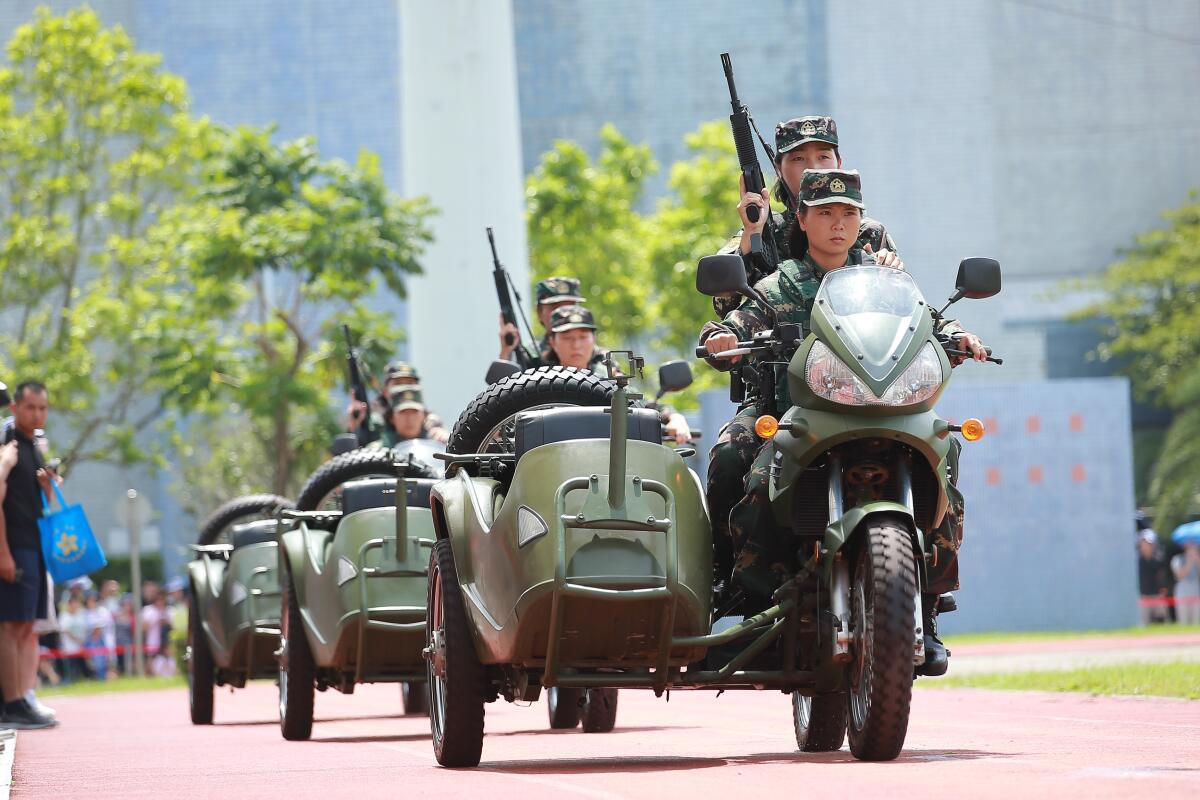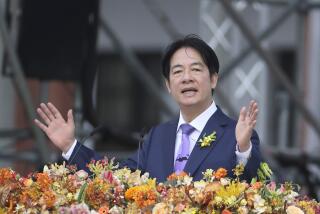Hong Kong protesters have been warned. China’s military issues a rebuke and a threatening video

- Share via
BEIJING — China’s powerful military issued a stern warning to protesters in Hong Kong Wednesday evening — simultaneously releasing a video to bolster its strong words — vowing to defend the nation’s sovereignty and maintain stability against “intolerable” demonstrations that have racked the semi-autonomous territory for weeks.
“We resolutely support the action to maintain Hong Kong’s rule of law by the people who love the nation and the city, and we are determined to protect national sovereignty, security, stability and the prosperity of Hong Kong,” said Chen Daoxiang, commander of the People’s Liberation Army garrison in Hong Kong. In an extraordinary rebuke at a Chinese army event Wednesday, Chen referred to the protests as “intolerable” and added that the military was ready to support Chinese sovereignty and keep order in Hong Kong.
The self-promotional PLA video the garrison released has been widely shared on Chinese social media.
Slogans of “Fight Terror” and “Maintain Stability” flash in the video as Chinese military officers slide down ropes from a helicopter, drive armored personnel carriers, and shoot missiles against a backdrop of dramatic music.

In one section that mirrors Hong Kong police clashes with pro-democracy protesters, an officer shouts in Cantonese, “All consequences at your own risk,” then charges forward with an armored phalanx of Chinese military troops, shooting tear gas at a group of pretend rioters.
Later, the music turns soft and inspirational as video rolls of civilians wiping sweat off officers’ faces and praising the PLA for being “strong,” “neat” and “handsome.”
Analysts say Chen’s comments and the video are part of a propaganda effort aimed at stoking domestic nationalism and putting psychological pressure on the protesters but that military action remains unlikely.
“The videos and statements are for a domestic audience, to show that they’re very determined to protect sovereignty and crush rebellious elements,” said Ho-Fung Hung, a sociologist at Johns Hopkins University.
But Beijing will likely only “heat up the rhetoric” without actually sending in troops, which would be too much of a liability for President Xi Jinping, he said.
“If the Hong Kong police accidentally or intentionally kill somebody or something bad happens, Beijing can always say the local authorities did it,” Hung said.
“If they use the PLA, it is going to be mobilized by the Central Military Committee and Xi Jinping himself, and if anything goes wrong, Xi Jinping cannot be exonerated from this.”
Beijing’s highest government office for Hong Kong affairs held a news conference Monday where spokesman Yang Guang said the central government backed Hong Kong’s police and government but did not directly answer questions about military intervention.
Yang, like Chen, only referred to a part of Hong Kong law stating that the PLA garrison would not interfere in local affairs unless requested by the Hong Kong government to maintain order.
Chinese officials have meanwhile accused the United States of orchestrating Hong Kong’s protests, which U.S. officials have denied.
Antony Dapiran, a Hong Kong-based lawyer and author of a book about dissent in the territory, agreed that the PLA video was part of a broader message of support for Hong Kong police, not an indication that intervention is imminent.
“The Hong Kong police are more than capable of maintaining order,” Dapiran said, adding that Hong Kong protesters have caused property damage but not “rioted” in the sense of looting, fighting or harming passersby.
Beijing’s support will likely empower police to switch from merely dispersing protesters to making mass arrests at upcoming protests, Dapiran said, adding that young protesters are no longer afraid of tear gas but might be deterred by riot charges and serious jail sentences.
Forty-four protesters arrested in clashes with police Sunday were charged with “rioting” this week, an offense punishable by up to 10 years in prison.
Beijing is walking a fine line in trying to scare protesters without going so far that China’s reputation is irrevocably damaged, said Willy Lam, professor of China studies at the Chinese University of Hong Kong.
When the PLA first sent tanks and armored personnel carriers into Beijing in 1989, they were initially surrounded by residents and “stopped in their tracks,” Lam said, before later massacring student protesters.
Xi does not want that scene to repeat in Hong Kong because it would destroy China’s reputation, drive a mass exodus of middle-class Hong Kongers, and cause the stock market to crash, Lam said.
Beijing might achieve its psychological goals by deploying only a few hundred of the PLA Hong Kong garrison’s several thousand soldiers to guard government buildings, Lam said.
“The best result, from Beijing’s point of view, will be that people will be scared.”
Chinese military propaganda is, so far, unlikely to deter protesters from continued demonstrations, including three marches over the weekend and a planned citywide strike and rallies in seven districts of Hong Kong on Monday.
As police escalate their means of repressing protesters, what started as a peaceful movement against an unwanted extradition bill has become an increasingly radical wave of anger against police, local gangs and chief executive Carrie Lam.
Lam has not spoken to the public this week, but she made an appearance at a PLA youth summer camp.
A growing coalition of representatives from Hong Kong’s education, law, business and civil society spheres are demanding an independent investigation into alleged police violence.
That investigation, along with forcing Lam’s resignation, would be Beijing’s two best options for de-escalation at minimal cost, professor Willy Lam said. But they are unlikely to happen.
“Beijing is dead-set against establishment of an independent commission of inquiry. They need the police, just as in Tiananmen they needed the soldiers,” Willy Lam said.
“Sacking Carrie Lam would mean succumbing to pressure from the protesters. It would mean admission that Beijing has made a mistake, and the Chinese Communist Party doesn’t like to say that it has made a mistake. So I’m afraid the impasse will continue.”
More to Read
Sign up for Essential California
The most important California stories and recommendations in your inbox every morning.
You may occasionally receive promotional content from the Los Angeles Times.











